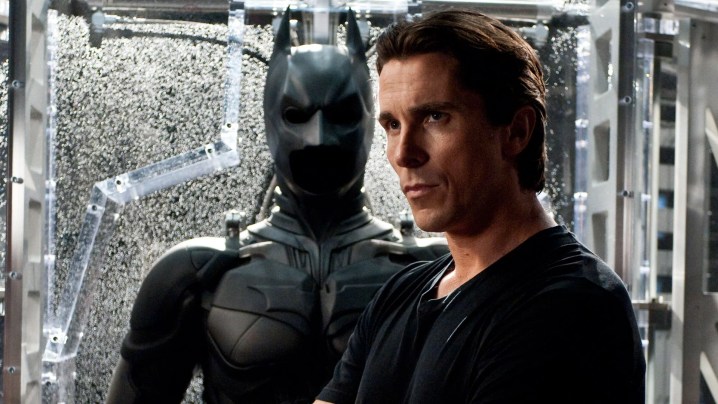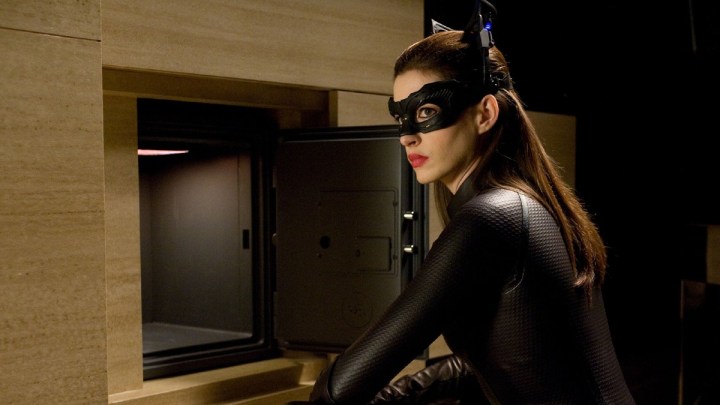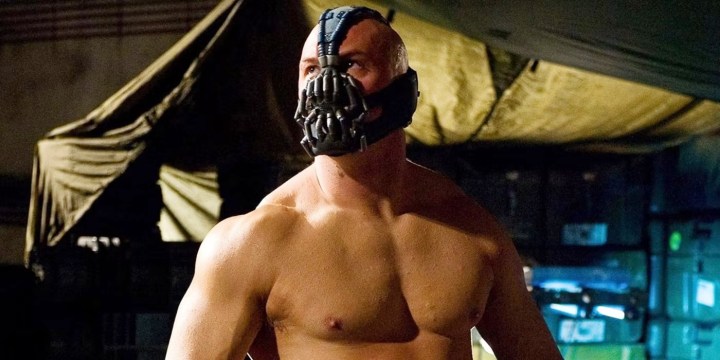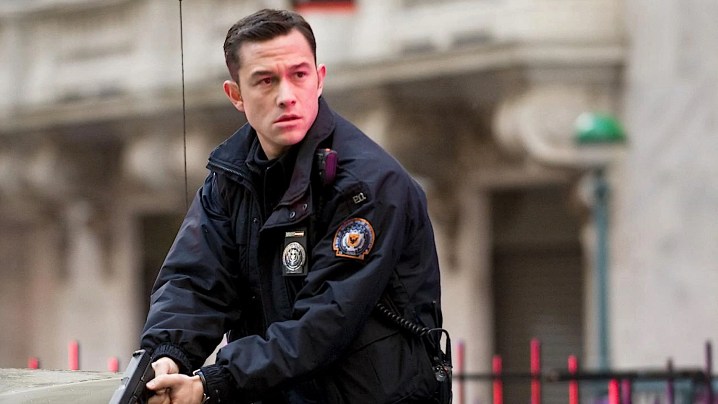This year marks the 10th anniversary of Christopher Nolan’s The Dark Knight Rises, a film best remembered as an underwhelming follow-up to a genuinely masterful sequel than as a worthy entry in its own trilogy. It must be difficult to act as the next chapter to what is, objectively speaking, the best superhero film in Hollywood history. Indeed, The Dark Knight‘s standing and legacy are too grand and meaningful, the closest thing to legendary that modern filmmaking has approached. Could any film compete with it?
Now, to be fair, The Dark Knight Rises is not a terrible movie. On the contrary, Rises is a tense, action-packed, grand spectacle that lives up to the much-maligned and often bastardized term “summer blockbuster.” But in the context of Nolan’s filmography, and especially his two Batman films that came before it, the film can’t help but feel underwhelming. Rises is fascinating because it had everything it needed to succeed, from great source material (Knightfall is one of Batman’s classic modern stories) to talented actors like Tom Hardy, Anne Hathaway, and Marion Cotillard breathing new life into old characters. The elements to make a fantastic, career-defining movie are all there, so why is it so disappointing and, worse, unmemorable? And why did it take so long for everyone to accept the fact that it’s not as good as it should be?
Bruce Wayne at his worst

Few pop culture figures have been as disrespected in recent years as Bruce Wayne. The character has always taken the back seat to the flashier and more mysterious Caped Crusader, but the new millennium took things to another level. Guided by Nolan’s Batman-is-the-face-and-Bruce-is-the-mask ideology, movies, cartoons, and even comics began to sideline Bruce until only Batman remained. And so, the deterioration of Bruce Wayne began, with nearly every portrayal of Batman declaring him uninteresting at best and unnecessary at worst.
Of course, that’s a pile of BS. There’s no Batman without Bruce. The man is as important as the Bat, and failing to see this is a blatant misinterpretation of the character. Nolan wasn’t the first to toy with the Bruce-is-the-mask idea, but he was the one to exploit it to its fullest — and ugliest.
The Dark Knight trilogy is an insult to Bruce Wayne in nearly every way possible. It portrays him as a prop, nothing more than a character played by the genuine persona, Batman, the brooding hunter that stalks criminals at night. In keeping with this approach, Christian Bale plays Bruce as a stiff and charmless bystander, a suit that somehow learned how to walk. All his intent and attention go to playing Batman, injecting the masked hero with genuine complexity and nuance. And Bruce can choke, for all Nolan and Bale care.
Nowhere is this clearer than in The Dark Knight Rises. With Batman out of the game for the movie’s first act, Nolan gets saddled with a character he simply doesn’t find interesting, and we can tell. Bruce’s scenes are uncomfortable and slow, there to allow for Batman’s eventual return. Because Nolan doesn’t find Bruce appealing, the audience doesn’t either. Every second Bale spends out of the cowl is torture for him and us, and we can tell he’s counting the seconds until he can put it back on.
The Dark Knight Rises features Bruce at his blandest, which isn’t great for a film that’s supposed to encourage its audience to root for Bruce, especially considering it ends (really old spoiler) with him abandoning Batman for good. That’s supposedly his happy ending, but how can he, or we, for that matter, be happy when it’s clear that everyone involved with the movie is happiest when the Caped Crusader is out and about?
Wait, is this supposed to be camp?

The words “camp” and “Christopher Nolan” don’t seem to fit in the same sentence. Nolan seems like the kind of director who would consider “camp” an insult to his prestige and hyperrealistic brand of filmmaking. But take a closer look at The Dark Knight Rises, and you can tell the camp is there. Whether intentional or not, the camp in the film is notorious and, occasionally, a highlight in an otherwise gloomy and needlessly convoluted story.
Take Hathaway, the closest thing we have to a modern-day camp master, as Selina Kyle, aka Catwoman. With her catsuit, bladed stiletto heels, and goggles that turn into excuses for cat ears, Hathaway’s Kyle is as ostentatious that a Nolan character will ever get. She comes this close to purring; perhaps she only stopped herself after Nolan flashed her a chilling look with those White Walker-like eyes.
There are remnants of the performance Hathaway could have given had Nolan’s “serious” approach not gotten in the way. I imagine it would be something between the comic’s exaggerated portrayal of the feline femme fatale and Michelle Pfeiffer’s luscious and almost fantasy-like take on the character in Tim Burton’s Batman Returns.

Hathaway isn’t the only actor close to camping it up in Rises. For all his menacing physicality, Tom Hardy’s Bane is full of flair. I’m not even talking about the goofy mask or the cargo pants; Hardy refuses to make Bane only a force of brutish nature. Instead, the actor injects flashes of life and energy into the character, from the voice to the mannerisms.
During his first battle with Batman, while the Caped Crusader is all confusion, rage, and frustration, Hardy’s Bane is practically strolling around the space, like a peacock flashing its tail. Bane delivers lines like “Do you feel in charge?” with delicious intent, twirling an imaginary mustache while savoring each word. Even his Swedish bomber jacket seems like a conscious choice to add some style to Bane.
Matthew Modine and, particularly, Ben Mendelsohn also do their part to raise the film’s camp stakes, emoting as if their lives depended on it. Mendelsohn’s character yells like this; Modine’s character dies in a pose bound to make Christians feel something. And let’s not even talk about Cotillard, whose over-the-top death scene has been widely, and rightly, ridiculed. In any case, this is as campy as a Nolan film will ever get.
So why not wear the camp badge with pride? Instead, The Dark Knight Rises walks with its tail between its legs, embarrassed at its flashes of chaotic energy. But it shouldn’t because those flashes are often the best parts of a movie that drags along whenever it’s trying to be deep. Sure, the car chases are great — few directors do car chases like Nolan — and the stakes are adequately high. But can anyone say they understood or even followed Bane’s elaborate plan to financially ruin Bruce Wayne before breaking his back and throwing him into a prison from which he eventually escapes with little to no effort?
The Dark Knight Rises has camp on its very DNA, so why not use it to its fullest? Because doing so would require admitting the storyline is exaggerated and, dare I say it, silly, taking away the prestige and self-seriousness that have become Nolan’s bread-and-butter. And we can’t have that.
Nolan on autopilot

Perhaps The Dark Knight Rises‘ most egregious mistake is Nolan’s lack of interest. The famed auteur seems uninterested to the point of boredom, going through the motions while trying to inject some sense of his trademark ambition into the story. Some of his distinctive elements are there — needlessly messy storytelling, a plot that keeps going even when you think it’s about to end, multiple male characters and only two women, impressive and imaginative action set pieces — however, it lacks purpose, which makes its more weighty themes seem unnecessary and underdeveloped.
Batman Begins was a fascinating exploration of fear and trauma. Nolan successfully combined both themes with the established Batman mythos, taking full advantage of underrated villains like Scarecrow and Ra’s al Ghul to tell a comprehensive origin for the man that would become the Bat. The Dark Knight was an exercise in escalation, an exploration of Batman’s limits and which moral boundaries he was willing to break or uphold. With the Joker and Two-Face, Nolan managed a perfect marriage between thematic inspiration and actual execution that remains unrivaled in the superhero genre.
And then there’s The Dark Knight Rises. Sure, it has deep themes, I guess — class struggle from a surprisingly conservative point of view instantly comes to mind. Rises is Nolan’s attempt at recreating the French Revolution on the streets of Gotham by way of New York City. However, Nolan’s ambitions feel half-baked. Unlike Nolan’s most daring and satisfying projects — Memento, Inception, even Interstellar — there’s nothing about Rises that separates it from other films in its genre. Despite its grandiose scale, it is frustratingly safe and by-the-numbers, two adjectives that don’t normally describe the risk-taking director.
To his own detriment, Nolan established himself as a unicorn in Hollywood, an ambitious and genre-bending figure who reconciled directorial artistry with blockbuster filmmaking. After the one-two punch of The Dark Knight and Inception, Nolan’s star was at its peak, meaning his fans and critics were at their most demanding. The Dark Knight Rises was not enough to satiate their thirst for more Nolan, plain and simple. The film was Nolan at its most timid, attempting to deliver something safe that would make everyone happy. Such a thing does not exist in Hollywood, and coming from an auteur, it’s even more jarring.
I guess we’re all suckers

So where does that leave The Dark Knight Rises? Compared to more recent superhero entries like Morbius or Thor: Love and Thunder, it’s not too bad. However, that says more about the current state of superhero cinema than about the quality of the film itself. The Dark Knight Rises is the weakest link in the trilogy; that’s more than enough to earn its diminished reputation. However, what makes it especially disappointing is its willingness to be the bare minimum; whereas its two predecessors fought to be the best, Rises settles with just existing.
Perhaps that is its true legacy: mediocrity. Like the character Joseph Gordon-Levitt plays in the film, The Dark Knight Rises reaps the rewards that its predecessors worked hard to achieve without doing anything. It gives us what we expected without surprising us like Batman Begins or challenging us like The Dark Knight. In Rises, Nolan is no longer interested in redefining or pushing the genre’s limits. All he wants is to be done with it and move on to Interstellar, asking Gordon-Levitt to turn the lights off on his way out.
With Rises, the Dark Knight trilogy had Nolan’s permission to die. And die it did, leaving behind a legacy of a barely remembered film that is more of a missed opportunity than a definitive statement.
Editors’ Recommendations
Credit: Source link


Comments are closed.